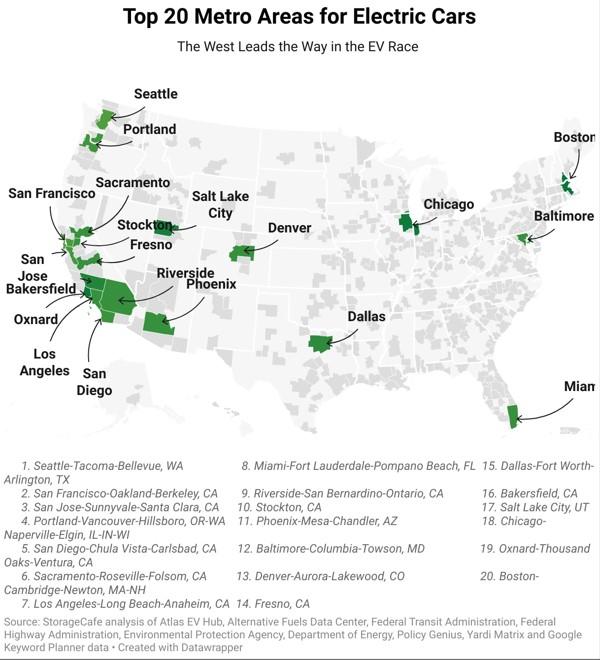Seattle is the best metro area for electric cars because of the high number of EVs, charging options and clean energy production, according to a new analysis.
Meanwhile, the US West has nine metro areas in the top 10 places for EVs. That leaves Miami as the only southern metro area in the top 10.
And, Los Angeles has the most EVs and the largest number of public charging stations among the 113 largest metro areas.
The study, conducted by StorageCafe, looked at several metrics, including the number of EVs, public chargers, the price of electricity, whether an area had a dedicated highway system (such as HOV), the condition of roads, clean energy, EV insurance and local incentives. StorageCafe, which helps people find storage units, also considered in the study local self storage provision as a criteria since EV drivers tend to be multicar owners and may find a need for self-storage.
Not surprisingly, California clamed more than half of the top spots in the top 10, noting that EVs have become a permanent fixture there. In the first half of 2022, 16% of California vehicle sales were electric, well above the national figure for EVs, which reached 6% of car sales. California saw EV ownership jump by 27% in 2021 over the prior year, reaching nearly 900,000 EVs. There are about 2.2 million EVs on the nation’s streets, according to the study.
Seattle did so well partly because it was top-ranked in the number of EV charging stations in apartment buildings, the number of registered EVs and an EV-friendly highway system. More than 7% of rental buildings in Seattle have charging stations. Also, there are about 0.6 public charging stations per 1,000 households.
Seattle also generated more than half of its electricity from renewables and an eGallon of electricity costs 90 cents, well below the cost of gas.
Miami ranked 8th on the list partly because of a high number of registered EVs, about 36,000 in 2021. About 4.6% of rental buildings in the area offered access to an EV charger. And an eGallon costs 90 cents.
The top 10 metro areas ranked best for electric cars were Seattle, San Francisco, San Jose, Portland, San Diego, Sacramento, California, Los Angeles, Miami, Riverside, California, and Stockton, California.
High prices for EVs still tend to keep EV adoption from advancing as quickly as many environmentalists would like. However, the shortage of public EV charging stations and the cost of electric energy in some areas are also seen as barriers.
“As the number of EVs grows, it will place an additional strain on [existing] stations, many of which already suffer from poor reliability and lack of maintenance,” said Don MacKenzie, associate professor or civil and environmental engineering at University of Washington. “Federal investment in a national network of fast chargers, funded by the 2021 Infrastructure Investment and Jobs Act, will help to mitigate these issues in the near term. With enough EVs on the road, research by our lab at the University of Washington indicates that there should be enough demand to support a healthy, self-sustaining market led by private sector investment. However, I've yet to see a convincing answer to the question of when we may hit the tipping point where government investment is no longer necessary.”
EVs are not for everyone, MacKenzie noted. If your driving patterns of parking arrangements mean you would be heavily dependent on public quick-charging stations, then an EV may not be a good bet. “Quick charging can be expensive and is hard on your battery,” he said. “It makes sense to use it occasionally but not as your primary charging station. Drivers who regularly tow heavy loads over long distances are also better off, at least for now, with an internal combustion engine.”
StorageCafe described its complete methodology online. One note: the study counted hybrids as EVs.
